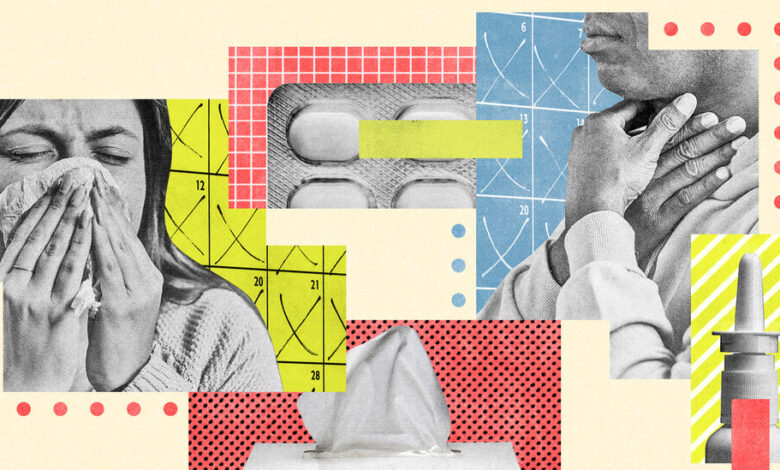Colds, Coughs, and Covid: Why it Feels Like Everyone Is Always Sick

These days, the background music of my life is a chorus of coughing and sneezing. At work, colleagues complain of scratchy throats and put illness emojis next to their names on Slack. At home, my daughter returns from day care with a backpack full of construction paper crafts and, more often than not, a runny nose.
No matter how much my husband and I wash our hands — and hers — the germs inevitably get passed on to our baby, and then to us. Sometimes it seems like there’s barely a break before another illness hits.
Whether or not you have kids, it can feel as though you are stuck in a cycle of never-ending illness this time of year. Particularly since the pandemic, it may appear as if you and your family are sick more often, and that your colds are more severe and coughs drag on for longer.
To some extent, it’s simple math — Covid now adds to the infectious diseases already spreading every virus season, said Dr. Nahid Bhadelia, founding director of Boston University’s Center for Emerging Infectious Diseases Policy and Research. In addition to the flu and R.S.V., there are more than 200 viruses that cause cold-like symptoms, including enteroviruses, rhinoviruses, parainfluenza viruses and common cold coronaviruses that are cousins of the virus that causes Covid.
As far as experts can tell, these viruses haven’t changed to become more severe. But one reason they could feel more intense now is because our bodies have forgotten how to fight them off, Dr. Bhadelia said.
The precautions we all took to lower the transmission of Covid in the early days of the pandemic also slowed the spread of these other viruses, Dr. Bhadelia said.
So when people began ditching their masks and mingling more, they were exposed to a variety of illnesses again.
Last year, the flu, R.S.V. and Covid all surged together in a tripledemic. Earlier this year, the Centers for Disease Control and Prevention noted that cases of strep throat were on the rise. And norovirus, which can cause fevers and vomiting, is also back along with regular old colds.
Unfortunately, immunity to many of the viruses that make people sick doesn’t last very long, Dr. Luis Ostrosky, chief of infectious diseases and epidemiology at UTHealth Houston and Memorial Hermann, said. That means your body has a sort of immunity debt to catch up on. “If your immunity dates back to strains that were in circulation three or four years ago, you’re needing to pay back,” Dr. Ostrosky said.
Once your body relearns how to create antibodies against a particular virus, you will likely experience milder symptoms and recover faster if exposed again, Dr. Ostrosky said.
Covid has also made us far more attuned to when we are sick, experts said. It feels like a bigger deal now when someone shows up to work or school with a hacking cough. “Pre-Covid, you would blow your nose and grumble a little bit, but you didn’t talk about it quite as much,” said Dr. William Schaffner, a professor of preventive medicine at the Vanderbilt University School of Medicine.
Paying closer attention to respiratory symptoms may also make it seem like we’re sick for longer, said Dr. Debra Langlois, a pediatrician at the University of Michigan Health C.S. Mott Children’s Hospital. But a 2013 review of common respiratory infections in children found that the time it takes for illness to resolve has always been staggering: It can take 15 days to clear a common cold, and 25 days for a cough to go away in most cases.
Adults can also have what doctors call a post-viral cough that lasts for three weeks or more after other symptoms go away. “My own husband has had a post-viral cough for weeks,” Dr. Langlois said.
And in some cases, it’s possible to develop a secondary infection in your sinuses, ears or throat that makes it seem like one illness is running into another. “It really stinks to be sick back to back,” Dr. Langlois said. “But what’s really reassuring to us as doctors is that even if you have a day or two or a week break, that means it’s a separate virus.”
There are also steps that can curb at least some infections, Dr. Langlois said, such as getting vaccinated against R.S.V. if you are eligible; making sure you are up to date on flu and Covid shots; and applying other lessons from the pandemic, like staying home when you’re sick and wearing a mask on airplanes.
For parents like me, with young children carrying every kind of germ imaginable, Dr. Langlois said there’s reason to hope we won’t keep getting sick so often: As children grow up, they’re a lot less likely to cough in your face and a lot more likely to wash their hands without a fight.
Source link



